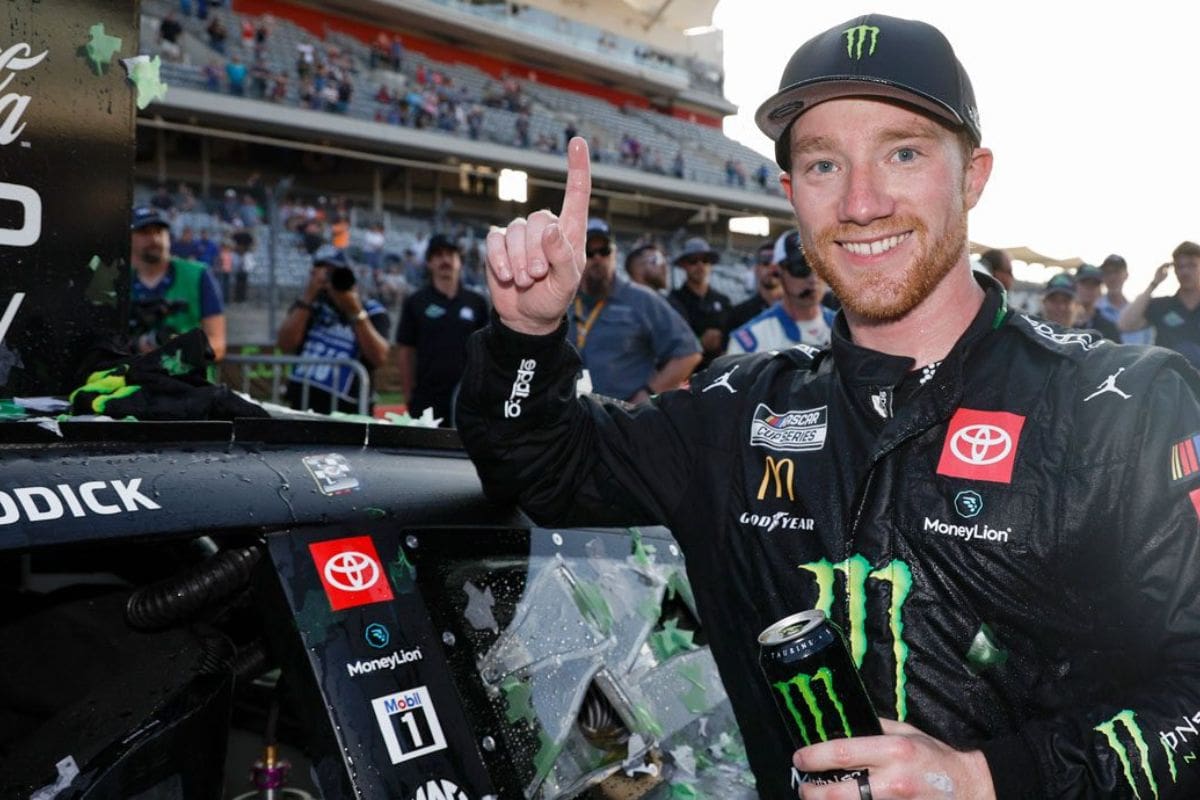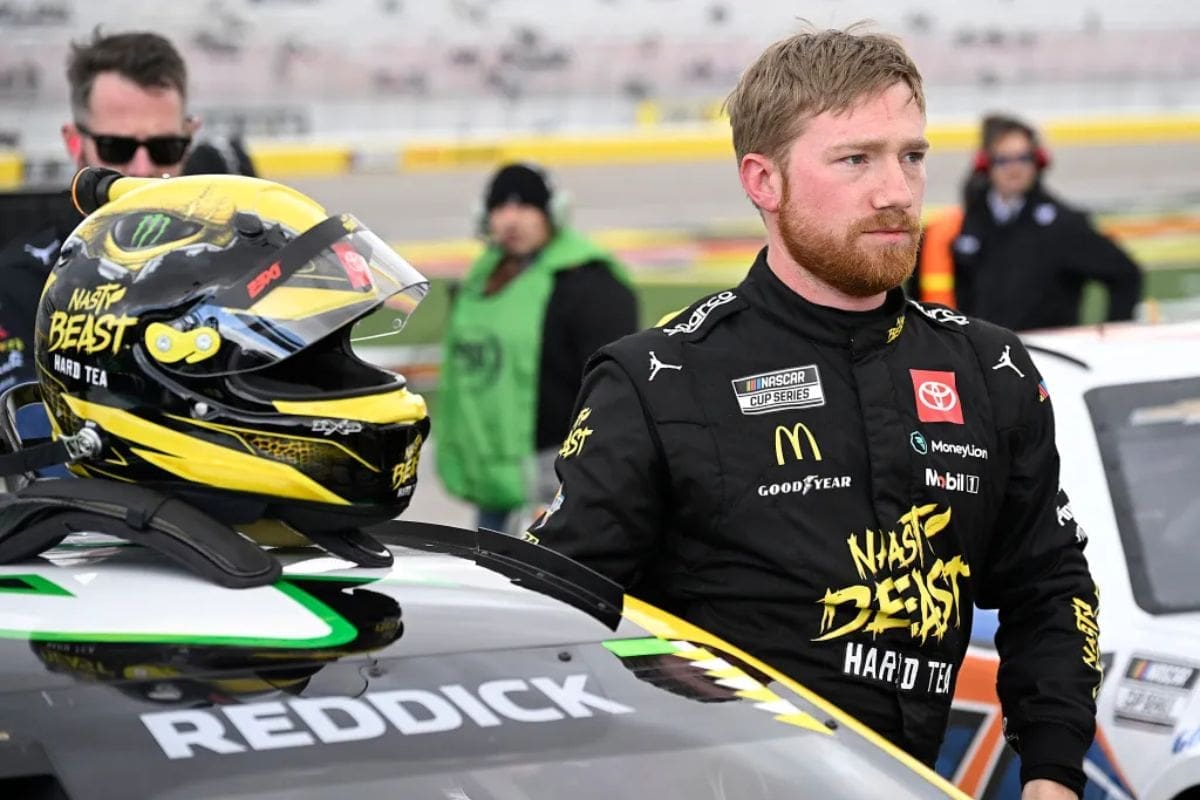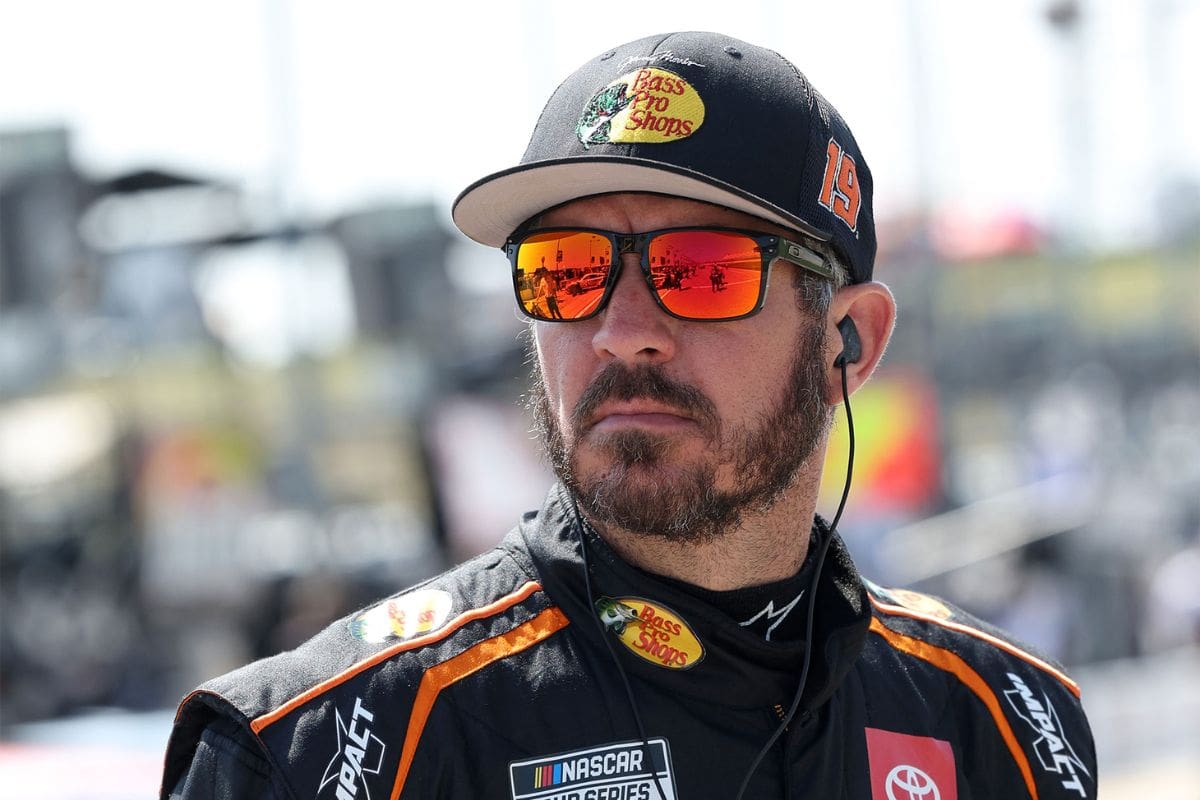Tyler Reddick Blames Son’s Illness for Bad Race: Tyler Reddick‘s recent assertion that his son’s stomach bug detracted from his championship performance raises intriguing questions about the intersection of personal and professional demands faced by athletes. The weight of familial responsibilities can often overshadow competitive ambitions, as seen in Reddick’s struggles during pivotal races. This scenario prompts a broader examination of how external factors influence an athlete’s mental state and performance. What strategies might athletes employ to navigate such challenges, and how do these experiences shape their careers in the long term?
Key Highlights
- Tyler Reddick’s son’s stomach bug caused emotional distractions, negatively affecting his focus during critical playoff races.
- Reddick experienced physical distress, including vomiting, while competing in the Southern 500 due to the illness.
- The illness led to diminished mental readiness, impacting Reddick’s performance in key championship moments.
- Team dynamics were tested as Reddick’s health struggles required strategy adjustments during the race.
- Reddick emphasized the importance of family well-being, prioritizing his son’s health over racing commitments.
Reddick’s Health Issues at Darlington
Tyler Reddick’s experience at Darlington was a representative of the intense physical and mental strain faced by professional athletes in racing environments. As the points leader, he entered the race with palpable momentum, showcasing his skill by maintaining a position in the top five. However, the demands of competition are often compounded by unforeseen personal challenges, and for Reddick, this race would test his resilience in ways beyond the track.
While Reddick’s equipment—his race car, firesuit, and pit crew—were in prime condition, the internal turmoil he grappled with greatly impacted his performance. Reports indicated that Reddick was battling the aftermath of a stomach bug that had affected his young son, a situation that likely weighed heavily on his mind. This personal strain can create a major distraction, undermining focus and fortitude during critical moments. The psychological toll of concern for a loved one can be as debilitating as any physical ailment.
In a sport that demands peak physical condition, even minor health issues can severely hinder performance. Reddick’s struggle at Darlington highlights an essential yet often overlooked aspect of professional racing: the intersection of personal life and career. Acknowledging this interplay is important for understanding the complexities athletes face.
Reddick’s Struggles and Background
Despite the promising start to his season, Reddick’s expedition has been fraught with challenges that extend beyond the racetrack. While he entered the Southern 500 with a commendable 17-point lead over rival Kyle Larson, his trek has been blemished by personal tribulations. The recent bout of illness he experienced post-Stage 1 serves as a poignant reminder of the unpredictable nature of life that can intersect with professional aspirations.
Reddick’s struggle is not merely a product of racing stress; it is intertwined with the realities of parenthood. After revealing that his 4-year-old son had recently suffered from a stomach bug, Reddick’s lamentations take on a deeper significance. The emotional toll of a sick child can weigh heavily on a parent, potentially distracting from the focus necessary for peak performance.
Tyler Reddick said the way he felt in the car today was the worst he's ever felt in a race car. Says his son was having issues last week at Daytona. Reddick started feeling iffy on Friday, felt he'd be okay after Saturday, and then it all unleashed today in the race.
— Toby Christie (@Toby_Christie) September 2, 2024
Even amidst these challenges, Reddick remains a formidable presence on the track. His ability to finish the race, despite feeling unwell, demonstrates his resilience and tenacity—attributes that have positioned him as a rising star in the NASCAR landscape.
As Reddick navigates the complexities of his racing career alongside family obligations, his experiences highlight the often-unseen battles that athletes face, illuminating the profound interplay between personal well-being and professional success.
Reddick’s Mid-Race Condition
Experiencing physical distress during a race can be a defining moment for a driver, and for Reddick, that moment arrived at a crucial crossroads in his championship run. The grueling demands of NASCAR racing are amplified when a driver battles illness, as was the case for Tyler Reddick.
Despite his impressive performance throughout the season—winning the regular season championship with two victories, 11 top-five finishes, and 18 top-ten results—he found himself confronting an unexpected challenge during a critical race.
Reddick’s condition deteriorated markedly during the event. He openly admitted to vomiting inside his car and discarding the medications provided by his team. His physical state, described as the worst he had ever experienced in a race car, reflects not only the intense strain of competitive racing but also the toll that illness can take on a driver’s mental and physical capabilities.
The origins of his ailment can be traced back to his son, Beau, who had fallen ill the previous weekend in Daytona. Reddick began feeling unwell on Friday, hoping to rally by Saturday, only for his symptoms to escalate during the race.
Reddick’s Radio Revelations and Team Response
During the race, Reddick’s radio communications became a focal point for both fans and his team, revealing the true extent of his struggle behind the wheel. Initially, his comments suggested a dire situation, capturing the attention of listeners who were concerned for his well-being. However, Reddick later clarified that much of what he communicated during the race was exaggerated. He managed to hold back the physical manifestations of his illness, thanks to medication provided by his team.
“Reddick says that despite what was said on the radio, he held all puke and other stuff in throughout the race. Says he almost was hoping to get it out during the race to get it over with, but it was able to hold off thanks to the pills from the team.” -toney Christie wrote in a post
The interplay between Reddick’s emotional state and his team’s response demonstrates the stress faced during high-stakes competition. The 23XI Racing crew had to balance their concern for Reddick’s health with the operational demands of the race. Their ability to maintain focus in the face of adversity speaks volumes about their professionalism and preparedness.
In retrospect, Reddick’s ability to manage his symptoms while racing not only highlights his resolve but also emphasizes the critical role of teamwork in motorsports. The 23XI Racing team’s swift response and adaptability guaranteed that they remained competitive, even when faced with unexpected challenges. This incident serves as a reminder of the psychological and physical demands of racing at such a high level.
Contingency Plans and Truex’s Situation
In NASCAR, contingency plans are vital, especially when unforeseen circumstances arise. During the Southern 500 at Darlington, Tyler Reddick found himself battling not only the competition but also a severe stomach bug that threatened his performance. As the laps wore on, the prospect of him exiting the race loomed large, necessitating a backup plan.
Enter Martin Truex Jr., another Toyota driver, who was poised to step in should Reddick be unable to continue. Truex’s own race took a disastrous turn, crashing out just two laps in alongside Ryan Blaney. This dual misfortune paints a vivid picture of the unpredictable nature of racing, where even the most carefully crafted plans can unravel in an instant.
While Reddick managed to persevere and finish the race, Truex found himself grappling with the implications of his early exit, yet still secured a coveted spot in the playoffs.
The contrasting trajectories of Reddick and Truex highlight the importance of resilience in the face of adversity. Reddick’s resolve to push through his physical discomfort emphasizes the mental fortitude required at this level of competition.
Meanwhile, Truex’s ability to maintain a positive outlook despite his misfortune reveals a tactical mindset vital for steering through the challenges of the playoffs. As the regular season draws to a close, both drivers exemplify the necessity of adaptability and focus, two qualities that will be paramount as they set out on their playoff paths.
“We should be fine. Hopefully, nothing out of our control happens and that’s really what it’s gonna take to get us out of there. If we can just run a smart race, have no failures, nothing crazy happens, we don’t get run over or crash or whatever early, we will be fine. Excited about our car. Thought it was really close today and the best one I’ve had here in a couple of years.” – Truex
News in Brief: Tyler Reddick Blames Son’s Illness for Bad Race
The challenges faced by Tyler Reddick during the championship run highlight the profound impact personal circumstances can have on professional performance. The intersection of family health issues and competitive stress exemplifies the vulnerabilities athletes experience. Reddick’s struggles serve as a reminder of the importance of mental resilience and support systems in sports. Ultimately, maneuvering through the complexities of personal life alongside professional commitments remains a critical aspect of achieving success in racing environments.
ALSO READ: Tyler Reddick Wins NASCAR Regular Season Crown in Nail-Biting Finish Against Kyle Larson



